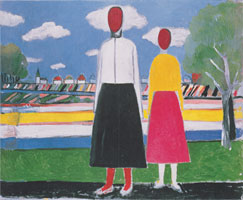
Experience and Reason in the Articulation of Values

Double Portrait attributed to Giorgione
Questions and conversations about values and valuing are fundamental to the humanities, but rarely become the subject of explicit public reflection. This reticence has enormous consequences in several areas. Disciplines in the humanities need to be more aware of what contribution they can make to the public discourses that need their perspective about values. But because the humanities are diffident in relation to talk about values, discourses about value questions are dominated by ethics on the one hand and by social science models of human interests on the other—discourses that attempt to explain values in terms of interests, institutional practices and ideologies. The humanities afford sharply contrasting experiences of values and reflections on them that represent how judgments are formed and decisions made. Since questions about how judgments are formed prove intricately varied and fluid, it is not surprising that the rendering of valuing gets staged substantially differently in many humanistic disciplines and in the arts that these disciplines study.
Why the “experience” of value? Research centers at major universities are dominated by theoretical and practical ethics because they are concerned primarily with policy questions rather than with how agents come to form the values they bring to those questions or how they go about the acts of evaluating objects or actions that are not perceived as practical in nature. Phenomenological approaches address the experience of coming to see something as valuable. Questions of how judgments are formed are especially important at a time when they are subordinated to questions about how those judgments might be justified. We see valuing in the humanities as rooted in concrete and often intimate processes of evaluation that emphasize becoming familiar with how people structure their cares and how events solicit attention. In both domains appreciation is a central figure for humanistic evaluation. That appreciation consists in refusing to go directly from the particular to a general assessment, but instead dwelling within the judging process in order to reflect on how pleasure and interest manifest themselves as we engage particular phenomena. This dallying within judgment has its own political implications, based not on assertions but on developing a mode of inquiry that appreciates processes and even suspends discursive judgment because it becomes aware of what is singular and compelling in the particular. Possibilities of mutual appreciation break down social boundaries.
Yet the more ambitious we become in pursuing such questions, the more pressing the need to recognize that these various approaches do not by any means provide a complete picture of the place of values and valuing in human lives. Humanists need to be as articulate as possible about the limitations of humanistic approaches. Only then will the humanities be able to enter fruitful dialogue with philosophers and social scientists. Our hope is to study what it would involve to show to other disciplines that the humanities have a perspective that is indispensible to any generalizations that they might establish. At the same time, humanists need to appreciate better the power their approaches have to clarify what values are and how we make judgments about them.

Zwei Figuren in einer Landschaft
by Kazimir Malevich
We might imagine sharpening the capacity to generalize about these modes of valuing by concentrating on the following questions or ideas: 1) How do we make aesthetic judgments and what is the use of the training in that cultural practice for attention in other domains that are not bound by aesthetic frameworks? What does it involve to watch oneself becoming engaged by sensuous states and cultivating the kinds of interests they elicit? How does attention to rhythm or harmony, or shades of colors, or the force of line establish something like powers that might matter in social encounters or make a difference in how one pursues political agendas? 2) What is the social value of close reading, especially reading for how agents develop ways of caring for the world and for other people? Why does it matter that the arts can claim to develop emotional IQ because they emphasize the fact that actions derive from, engage, and provide terms for assessing affective interests? Why might it matter that a society learn to interpret actions with this kind of attention? 3) Imagined actions have contexts that spread well beyond literary concerns. There has been a great deal of attention paid in the humanities and in anthropology to how social groups and ideologies shape the affective structures that influence particular actions, creating both distinctive kinds of passions and distinctive blind spots toward other ways of engaging events. More generally, these disciplines increasingly ask about the fundamental satisfactions in social life that resist rationality and provide models for resting in various emotional relations ranging from care for the other to intensities made possible by closing off the world into individual monads. 4) Finally, many of our historical disciplines focus literally and figuratively on how the shape of a particular language at a particular time affords shadings central to how agents and groups experience and pursue values. Think for example about work on shame and guilt in Greek and in Hebrew Culture, or work in the Enlightenment on the roles of pity and sentiment in shaping ideals for valuing other people.
We hope to focus on close reading with attention both to intimate aspects of how emotions are inseparable from thinking about actions and to how texts adapt this particularity in relation to the large scale economic questions. We would like to engage with makers and scholars in the arts who are eager to reflect on what is involved in performing for the appreciation of audiences, with those able to develop anthropological and historical accounts of what gives large scale shapes to how people experience and talk about values, and finally with both economists and those interested in philosophy to bring constant pressure on the group to appreciate the roles and the force of demands for articulate justification and concerns for the welfare of large groups. Our culture is fascinated by concerns about values but tends to offer narrow discipline-based accounts because academics simply have not cooperated or even shown much sympathy for competing approaches, even when there is not great distance between the perspectives. In the long run we can imagine opportunities for team-taught graduate courses and collaborative research projects among graduate students in different disciplines. Imagine a dissertation by a theorist of literary reading done in constant dialogue with professional work in ethics, or imagine studies of resistance to institutional values generated from dialogues among literary critics, historians, economists, and anthropologists.
Professors Charles Altieri (English) and Susan Maslan (French) convened a Strategic Working Group on “The Experience of Value" in 2012.
This article can be found in the February/March 2011 newsletter.